3rd Annual Island Futures Gulf Island Gathering – August 7-9
 Island Connections is a not-for-profit project affiliated with a Gabriola-based organization called Island Futures. The aim is to connect Gulf Islanders interested in fostering sustainable ways of living through a sharing of information and ideas, facilitated by a network of privately owned boats.
Island Connections is a not-for-profit project affiliated with a Gabriola-based organization called Island Futures. The aim is to connect Gulf Islanders interested in fostering sustainable ways of living through a sharing of information and ideas, facilitated by a network of privately owned boats.
The third annual Island Futures Gulf Island Gathering is set for August 7-9 at Montague Harbour Provincial Park on Galiano. The group campsite and pavilion has been reserved and the focus of this year’s event will be creating a space for real inter-island collaboration to take place. The day will be divided into morning and afternoon sessions which will consist of presentations to be followed by in-depth discussion. Two focus areas will be chosen from the following four possibilities: Energy, The Environment, Transportation and a Gumboot University (life skills learning centre) for the Gulf Islands. The organizers are seeking feedback so please email info@islandfutures.ca to cast your vote, make suggestions and/or find out more about the event.

 Gather in our Hall kitchen to learn a tasty recipe that puts those veggies in your storeroom to good use. We’ll be making soup, pasta sauce and other yummy treats. Come cook, have supper, and take home food for your freezer.
Gather in our Hall kitchen to learn a tasty recipe that puts those veggies in your storeroom to good use. We’ll be making soup, pasta sauce and other yummy treats. Come cook, have supper, and take home food for your freezer.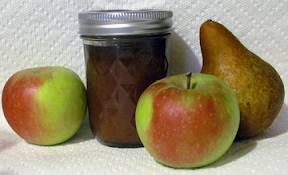 Learn how to make homemade applesauce or Pear Butter that is much tastier than store bought, perfect for school lunches or serving with latkes. Please bring 4 x 250ml jars and any apples (from your own apple trees only please).Fingers crossed we will be using apples or pears from the Gleaning program.
Learn how to make homemade applesauce or Pear Butter that is much tastier than store bought, perfect for school lunches or serving with latkes. Please bring 4 x 250ml jars and any apples (from your own apple trees only please).Fingers crossed we will be using apples or pears from the Gleaning program.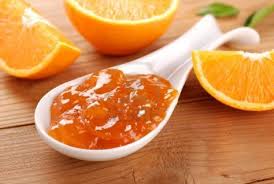 More summer in a jar! We’ll be making jam the old-fashioned way. Long boil style, with the wrinkle test and thermometers, and canning it using a boiling water bath. Alison will demonstrate jelly-making, and we’ll put up one kind of marmalade. There will be a discussion on the various pectin levels of different fruits at different times of the year.
More summer in a jar! We’ll be making jam the old-fashioned way. Long boil style, with the wrinkle test and thermometers, and canning it using a boiling water bath. Alison will demonstrate jelly-making, and we’ll put up one kind of marmalade. There will be a discussion on the various pectin levels of different fruits at different times of the year.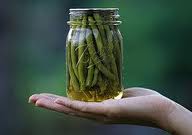 Pickled foods offer intense flavours to enhance your winter diet. By preserving local crops now when they are at the height of freshness, you can capture their best flavour and nutrition.
Pickled foods offer intense flavours to enhance your winter diet. By preserving local crops now when they are at the height of freshness, you can capture their best flavour and nutrition.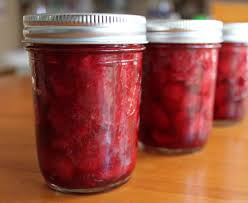 Galiano summers yield an amazing variety of tree fruits and berries, available from our farmers, through our Gleaning program and in your own backyard. Making jam is a great way to capture the taste of summer in a jar to brighten up those dark winter days.
Galiano summers yield an amazing variety of tree fruits and berries, available from our farmers, through our Gleaning program and in your own backyard. Making jam is a great way to capture the taste of summer in a jar to brighten up those dark winter days.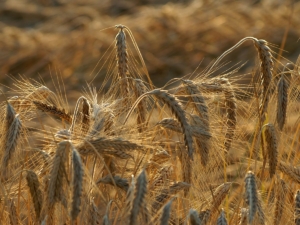 As an experiment, last year I acquired seeds for ten varieties of wheat and four of barley from Salt Spring Seeds and other sources and planted a small test row of each variety in my garden. After initial watering no further water was provided to the growing grain other than rainfall. Germination rates varied among the varieties but all produced grain, which was harvested in late September. In addition to the amount of grain produced, I wanted to see how susceptible the different varieties were to “lodging”, i.e. falling over in wind or rain due to height and top-heaviness of the seed head. Wheat breeders for many decades have selected for shorter, sturdier plants, and more recently for hull-less and bristle-less seed heads to make threshing easier.
As an experiment, last year I acquired seeds for ten varieties of wheat and four of barley from Salt Spring Seeds and other sources and planted a small test row of each variety in my garden. After initial watering no further water was provided to the growing grain other than rainfall. Germination rates varied among the varieties but all produced grain, which was harvested in late September. In addition to the amount of grain produced, I wanted to see how susceptible the different varieties were to “lodging”, i.e. falling over in wind or rain due to height and top-heaviness of the seed head. Wheat breeders for many decades have selected for shorter, sturdier plants, and more recently for hull-less and bristle-less seed heads to make threshing easier.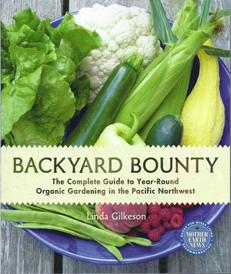 Get set to plant all kinds of hardy vegetable seeds this summer to keep you in fresh food all winter—no greenhouse required! Root vegetables will keep in the soil until you’re ready to eat them, and with some simple protection measures you can pick salad greens all winter.
Get set to plant all kinds of hardy vegetable seeds this summer to keep you in fresh food all winter—no greenhouse required! Root vegetables will keep in the soil until you’re ready to eat them, and with some simple protection measures you can pick salad greens all winter.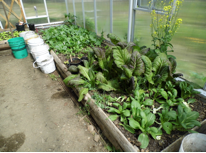 Sunday May 5th from 10 to 12am.
Sunday May 5th from 10 to 12am.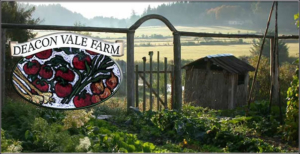 The Food Program is will be making a field trip to Mayne Island to visit
The Food Program is will be making a field trip to Mayne Island to visit